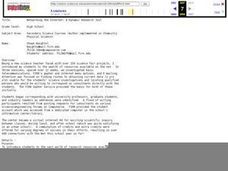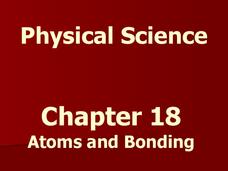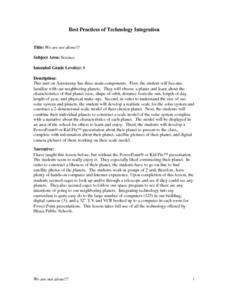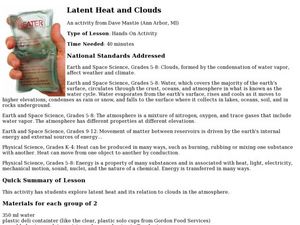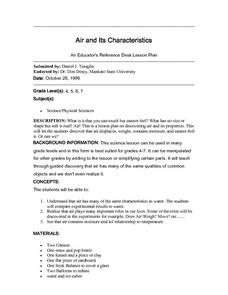Curated OER
Motion Near Earth
In this motion worksheet, students will match 5 physics vocabulary words relating to motion with their definitions. Then, they will review 9 statements of different motion scenarios to determine is the statement is true or false....
Curated OER
Energetic Atoms - Active & Spaced Out
Students discover the power of the sun through an outdoor experiment. In this solar power lesson plan, students view a PowerPoint presentation on atoms before they complete an atom worksheet. Students utilize a solar bag to demonstrate...
Space Awareness
Oceans as a Heat Reservoir
Oceans absorb half of the carbon dioxide and 80 percent of the greenhouse gases released into the atmosphere. Scholars learn how and why the oceans store heat more effectively than land and how they help mitigate global warming. Pupils...
EngageNY
TASC Transition Curriculum: Workshop 9
Here's a workshop for teachers that rocks the academic world! Using earthquakes as a medium for instruction, educators learn about crosscutting engineering with science. Fun, hands-on, collaborative exercises encourage participants to...
Curated OER
Water and Ice
Students explore water. In this water lesson, students explore the physical properties and states of water. They observe how water changes states and document what they see.
Curated OER
Networking the Internet: A Dynamic Research Tool
Learners engage in a lesson that is concerned with the research of finding information to help them develop new science projects. They conduct research using a variety of resources that includes e-mail and discussion groups.
K12 Reader
Measuring Temperature
Fahrenheit? Celsius? What's the difference, and where did these two temperature scales originate? Your pupils will learn all about these topics by reading the passage included here. After reading, individuals respond to five questions...
Curated OER
Black Holes Word Search
In this black holes word search, students locate terms relating to a black hole. A list of ten words is provided. An answer sheet is available.
Curated OER
Cycling of Matter and Energy
These twenty various types of questions related to the cycling of matter and energy require students to match each definition in column 1 with the correct vocabulary term from column 2. Then, students explain what is being demonstrated...
Curated OER
States of Matter
Properties in measurement, pressure and viscosity of solids, liquids, and gases are the main topics covered in this slideshow. The explanations of Pascal's, Bernoulli's, and the Venturi effects are very clear. Easy to understand diagrams...
Space Awareness
Star in a Box
What happens to stars as they get older? A simulation takes pupils through the life cycle of stars based on their masses. The resource introduces the Hertzsprung-Russell diagram and the common relationships and life cycle patterns observed.
Space Awareness
Measure the Solar Diameter
Scientists could measure the diameter of the sun before they knew its distance. Scholars construct a simple mirror box to measure the diameter for themselves. They compare this measurement with the official size, listed in a textbook,...
Mr. E. Science
Atoms and Bonding
I don't trust atoms because they make up everything. Budding scientists learn about famous scientists connected to atomic models, chemical, ionic, and hydrogen bonds. The presentation also presents how to count atoms in an equation,...
Urbana School District
Electric Fields
What kind of pears do electricians eat? Amperes! Presentation begins with electric field vectors for various charge configurations and field strengths for both point charges and uniform fields. It continues with various surfaces,...
DiscoverE
Build a Big Wheel
Pasta is great for cooking—and for making Ferris wheels. Aspiring engineers use an assortment of pasta types to create a functioning Ferris wheel. They keep track of the design process to refine their designs, if necessary. Let's hope no...
American Museum of Natural History
Light Quest
Grab a partner and shed some light on light. A remote learning resource has scholars play a board game to answer trivia questions about light. They also read about how Einstein contributed to the understanding of light as both a wave and...
American Museum of Natural History
Make Your Own Einstein Stationary
No need to be an Einstein for this project! Clever crafters add their name, address, and country to three Einstein-themed templates and create their own, personalized stationary. A great way to stay connected while social distancing.
Curated OER
We Are Not Alone!!!
Eighth graders explore the area of astronomy. They explore Earth's neighboring planets. Students research a planet's characteristics. They develop a scale model of the solar system and a narrative about the planets.
Curated OER
Animal Coverings
Students compare and contrast the types of coverings found on animals. They identify a wide variety of animals in a museum room. They classify animals based on their coverings as well.
Curated OER
Shake, Rattle and Roll
Students compare the weathering of materials. in this weathering lesson, students experiment with the chemical and physical weathering of different materials. Students use salt and water as an example of how weathering occurs.
Curated OER
Latent Heat and Clouds
Learners explore latent heat and how it relates to clouds in the atmosphere. In this earth science lesson students investigate how clouds are formed. Learners examine clouds and the water cycle.
Curated OER
Solids, Liquids, and Gases
Students explore the three main forms of matter: solid, liquid, and gas. They examine concrete examples of each, using their five senses and "experimenting" to find differences in them. They find pictures of each, cut them out and past...
Curated OER
Hero Or Zero?
Students investigate science and technology by reading a children's book. In this reading comprehension instructional activity, students read the story Archibald Frisby and discuss the ways we use science and technology in everyday...
Curated OER
Air and Its Characteristics
Young scholars explore air through guided discovery. In this air lesson, students will observe three demonstrations about air. They will answer leading questions as they observe how air displaces and takes up space, how air has weight,...







